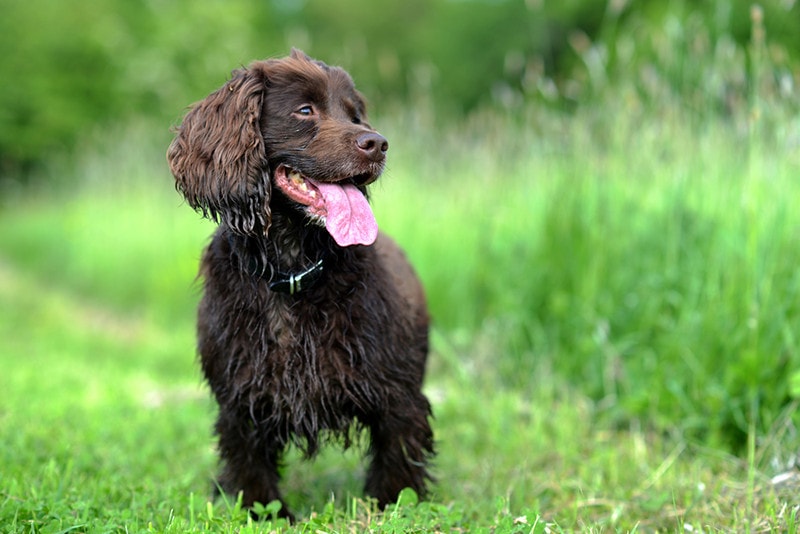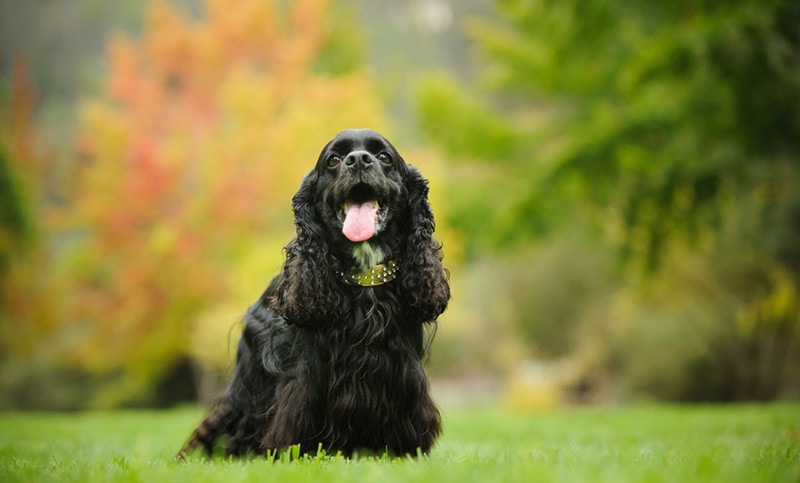Click to Skip Ahead
Cocker Spaniels have that classic puppy face that is hard to resist. The big, dreamy eyes, long silky ears, and charming personality make them stand out. However, you need to look past the seemingly perfect traits before deciding to add one to your family.
When deciding to adopt any dog, knowing the pros and cons and understanding what you are getting into is vital. While they are usually minor compared to the joy they bring, it’s up to you to decide if the drawbacks are something you can handle. We’ll discuss the advantages and disadvantages of owning a Cocker Spaniel below.
The 12 Pros and Cons of Having a Cocker Spaniel
Cocker Spaniel Pros
1. They Are an Adaptive Breed
A Cocker Spaniel’s adaptability is just one trait that makes them a popular pet. They can easily adapt to different surroundings and personalities without changing their overall demeanor. An adaptable dog is easy to handle, eager to please, cooperative, gentle, and affectionate, and that is a Cocker Spaniel in a nutshell.
This makes them great for families that live in apartments, and they can easily be introduced to other pets, children, and seniors. The more socialization and training you give your Cocker Spaniel, the easier it will adapt to new environments, schedules, and people.

2. Highly Intelligent
Cocker Spaniels are highly intelligent. They were ranked as the 20th smartest breed in The Intelligence of Dogs by author Stanely Coren. Cocker Spaniels should be able to comprehend new commands in 5 to 15 repetitions and comply with the first command 85% of the time or more.
Cocker Spaniels make eager playmates for children and are happy to please their owners. They can be easily trained for canine sports and provide companionship. The Cocker Spaniel enjoys the challenge of performance activities, so you should have fun figuring out your dog’s favorite ones and sticking with those when training.
3. Great Family Pets
Cocker Spaniels are the ultimate family pet. They are gentle, loving, eager to please, and will fit into most family dynamics. They are rated 5 stars regarding their compatibility with children, and they are gentle around seniors. They are active enough to be playful and are easy to train due to their high intelligence. They love being with their humans and participating in whatever they are doing.
4. Eager to Please
Cocker Spaniels have an inherent drive to please their owners. They are also food-motivated, so the combination makes them great for training. You can quickly train your Cocker Spaniel to follow a set of behaviors.
An eager-to-please breed like a Cocker Spaniel will need positive reinforcement training and won’t respond well to being scorned or punished. They are sensitive and will hate knowing they haven’t pleased their owner. They will seek out and repeat pleasurable experiences and avoid negative ones.

5. Friendly
In general, Cocker Spaniels are very receptive to meeting new people. They tend to be more sociable around other dogs and strangers. However, this doesn’t mean you can immediately introduce dogs to your Cocker Spaniel when it’s not leashed. The dog still needs socialization and training in the early days and perhaps puppy obedience classes to ensure your Cocker Spaniel will live up to its friendly name.
- See Also: How Good Is a Cocker Spaniel With Cats?
6. Cocker Spaniels Are Generally a Healthy and Long-Lived Breed
Most cocker spaniels have long, healthy lives free of the severe health issues common in other breeds. Their average lifespan is 15 years, which makes them great companions for young kids so that they can be by their side through their most critical years.
It is also essential to look after your Cocker Spaniel so that it can live a long and healthy life. They require a balanced diet, regular exercise, mental stimulation, and regular veterinary checkups. The two most frequent health problems are ear infections and eye issues, which are easily treatable and can be proactively avoided with simple hygiene practices.
7. Cocker Spaniels Come in a Handful of Different Coat Color Options
No other breed has quite the spectrum of coat colors that Cocker Spaniels have. There are about 24 coat color and pattern variations of the Cocker Spaniel, with gold being the most popular. All Cocker Spaniels come in a mix or variety of the 24 primary colors; some have markings and ticks, and others have patterns and spots. Some well-known Cocker Spaniel coat colors are black, golden, black and tan, black and white, liver and white, blue roan, and sable.

Cocker Spaniel Cons
8. High Maintenance
Cocker Spaniels are loved for their long luscious coats, but those coats require regular brushing, almost daily, to ensure their coat doesn’t get tangled or matted. When combing your Spaniel’s ears, take care around the delicate skin on the edges.
Your Cocker Spaniel will need baths with dog-friendly shampoo, and you will also need to learn how to correctly check and clean your Spaniel’s ear canals as they are prone to infection. Speaking to your vet about grooming techniques or using a professional groomer who often works on Cocker Spaniels may be helpful.
9. Cocker Spaniels Require a Significant Amount of Exercise
The Cocker Spaniel requires a lot of exercise to keep its muscles in shape, but not necessarily to expel excessive energy. They will need about 40 minutes of exercise a day which is better broken up into sessions, preferably one in the morning and one in the evening.
Your Cocker Spaniel will be happiest when its owner is involved, so exercise can include a walk or run, playing fetch, or playing around with the kids.
A dog that is exercised is a good dog, but if your dog doesn’t receive adequate exercise, it may result in boredom, leading to destructive behavior.
10. Prone to Ear Infections
The droopy and silky ears of a Cocker Spaniel are so adorable, but what makes them adorable also makes them prone to ear infections. There are three types of ear infections: otitis externa, media, and interna. The most common is otitis externa, in which the layer of cells lining the outside part of the ear canal becomes inflamed.
Otitis media and interna are infections of the middle and inner ear canals and often develop due to the external ear being infected. Otitis media and interna can be highly dangerous conditions that cause vestibular signs, facial paralysis, and deafness. That is why it is important to regularly check your dog’s ears and act fast when there may be an issue.
Learn from your vet the right ways to regularly clean your Spaniel’s ear canals, particularly after a bath, to prevent infections.

11. They May Display Food Aggressive
Some Cocker Spaniels have been known to show food aggression. This can range from mild to more serious and occurs when the dog is eating and has the need to guard its food. A Cocker Spaniel may run away with its food, growl at someone nearby, or even bite or chase someone away. Some dogs simply protect toys or chew bones, while some guard stolen food items. Most dogs, however, are protective of their food.
Consider studying resource guarding and food aggression if you’re thinking about getting a Cocker Spaniel so that you can form healthy habits and stop the behavior from happening.
12. They May Bark a Lot
Barking frequently and loudly are well-known characteristics of Cocker Spaniels. A Cocker Spaniel will bark nonstop if not properly trained, and this can be a problem for people who have close neighbors, a newborn baby, or intolerance to barking. They were bred to be hunting dogs, and barking is a characteristic of hunting, so it still stays with them today.
Some Cocker Spaniels may experience separation anxiety if their owners are away most of the time, which frequently results in them barking more.
Final Thoughts
All dogs have their pros and cons, including the Cocker Spaniel. The pros very often outweigh the cons, but it’s important for any owner looking to adopt a new dog to know and understand the drawbacks that must be handled. Sometimes just one con can be a deal breaker in certain circumstances. It is also important to learn how to properly socialize, train and care for the Cocker Spaniel, as this can solve most of the issues you may experience.
Featured Image Credit: Yuriy Kozak, Shutterstock











